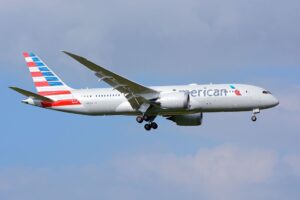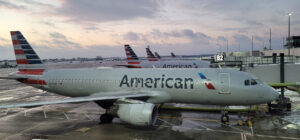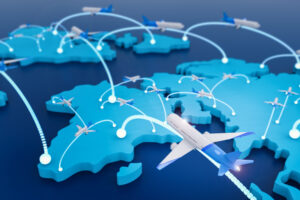FAA rules: Airline pilots must fly shorter shifts, rest more
#31
Join Date: Feb 2008
Location: CMH
Programs: Delta Gold Medallion
Posts: 628
I understand the difficulty of the situation Skoker, realizing that this NPRM is needed. The "other" NPRM (pilot flight hour rules) completely misses the mark IMHO.
#32
Join Date: Jun 2008
Location: MSP
Programs: DL PM
Posts: 768
Perhaps this.
#33
FlyerTalk Evangelist
Join Date: Aug 2004
Location: The best state in the USA - Florida!
Programs: Marriott Titanium/LT Plat, AS MVP75K, AA PlatPro, UA Premier, Disney AP
Posts: 14,498
If only the exec compensation is more in line with what they are worth instead of the so called "on par with industry standards", there will be more money for training, maintenance etc and wont have to bleed money and gut benefits.
I don't mind paying more for safer travel or to breathe cleaner air. Prevention requires fewer resources than remedy.
I don't mind paying more for safer travel or to breathe cleaner air. Prevention requires fewer resources than remedy.
Back to the point, I'm glad to see this come into play. From a large airline standpoint, I'm not sure how much of an impact it will have, as the large carriers tend to have flight deck contracts that don't push for bare minimums. Where it should help safety even more is on the regional side, where the standups, etc. are something that seems dicey (for those not knowing, a standup is when a crew works a flight, has a quick overnight, then back after about a 5-6 hour layover, thus staying under their total duty time, but not getting much sleep at all).
#34
Join Date: Feb 2008
Location: CMH
Programs: Delta Gold Medallion
Posts: 628
Really? That's your arguement? The window to drink would be mighty narrow without risking his/her certificate.


The regulations say "under the influence of alcohol." Case law says that being hungover still counts as being "under the influence!"
#36
Join Date: Jan 2011
Location: DFW...at the moment
Programs: AA EXP, SPG Plat, Hyatt Diamond, HH gold
Posts: 609
If airfares were to increase or delays get worse, a lot of people could decide to drive rather than fly. If that were to happen, the regulation would have the opposite effect of what was intended: instead of preventing another 50 deaths in hypothetical RJ crashes, an additional 50+ people die on the motorways each year.
I don't know enough about crew rest issues to weigh in on this specific issue, but additional regulations in the name of 'safety' are not always a net positive, and I know people never seem to consider the unintended consequences to rule changes and additional regulation before implementation.
Just my $.02
#37
FlyerTalk Evangelist
Join Date: May 2001
Location: LAX; AA EXP, MM; HH Gold
Posts: 31,789
Pilots sometimes screw up. Occasionally, those screwups result in loss of life, like the 50 who died in BUF because a couple of pilots screwed up. Like the 49 who died in DL 5191 because the Comair pilots attempted to take off from the wrong runway. Like the 265 who died on AA587 when the first officer stepped so hard on the rudder pedal that the vertical stabilizer broke off. To be sure, we should try to learn from the mistakes of others to try to prevent repeats.
It's possible that this change will only increase costs and not increase safety, regardless of how offensive you find that argument.
#38
Join Date: Apr 2006
Posts: 1,572
I guess I should throw in the disclaimer that I have a bit of a personal connection to the issue. That could have very easily been my backyard that N200WQ took out, had BUF been landing on 5 that night and not on 23 like they were, the aircraft would have landed pretty damn close. I was working at BUF that night, those familiar with the crash know that DL-1998 was one of the key flights that ATC was talking to trying to figure out what happened there, as I sat in our dispatch office listening to our radio uplink, I heard the whole thing play out and we freaked because we at first thought it was our flight that was involved. Of course, it wasn't, but 1998 was my flight to meet that night. Deplaning was quiet. The pax really knew something was up, but weren't really sure what, and the crew were absolutely white and left without saying a word. Our MD-88 arrived into gate 25, that Q400 was due into the gate next to us, and we were very close to the CO ground ops folks, and I silently did myself upstairs, chugging away at DLTerm closing out the flight and dealing with some ACARS stuff, and then went on the ramp and watched as half the ramp looked to the east, waiting to see something. We watched as the airport exploded with activity, the BUF ARFF (Aircraft rescue and firefighting) crews all sprung to action, and started to make their way to the crash site. Transit Police more or less deserted the airport to head over, and a group of TSA guys went too.
I made my way up front to the FTO with some of the CO folks, where everybody waiting for pax off of 3407 had assembled. At this point, the media had started to arrive, and the LERAP (Local emergency response action plan) was activated. We got access to the US Airways Club on the concourse, and as planned, a family reception center was set up there. No cameras allowed. We were fed updates from various local first responders, but families seemed to know more than we did through cell phones, etc. It was not a pretty site. By soon enough, morning had come, and the airport sprung to life, so the county set up with the Red Cross an assembly area at the Cheektowaga Senior Center and we shuttled everybody there. By then, I was exhausted, and went home and got some semblance of sleep. When I came back, things were different, but everybody acted like nothing ever happened.
That's one of those things thats like 9/11... you're forever scarred by it. It's always hard to learn of these things, I was very upset to hear about OH 5191 at the time, that was shortly before I was due to start working there. But to have it happen so close to home- literally- that's the killer.
So I apologize if I get touchy on the subject a bit, and I hope you'll all understand. It's part of the reason I'll never set foot on a Q400 either- regardless of the cause of the accident, I don't feel safe on them, and that was exacerbated by watching one land as the wheels fell off of it, same route, EWR-BUF, same airport, same runway.
I made my way up front to the FTO with some of the CO folks, where everybody waiting for pax off of 3407 had assembled. At this point, the media had started to arrive, and the LERAP (Local emergency response action plan) was activated. We got access to the US Airways Club on the concourse, and as planned, a family reception center was set up there. No cameras allowed. We were fed updates from various local first responders, but families seemed to know more than we did through cell phones, etc. It was not a pretty site. By soon enough, morning had come, and the airport sprung to life, so the county set up with the Red Cross an assembly area at the Cheektowaga Senior Center and we shuttled everybody there. By then, I was exhausted, and went home and got some semblance of sleep. When I came back, things were different, but everybody acted like nothing ever happened.
That's one of those things thats like 9/11... you're forever scarred by it. It's always hard to learn of these things, I was very upset to hear about OH 5191 at the time, that was shortly before I was due to start working there. But to have it happen so close to home- literally- that's the killer.
So I apologize if I get touchy on the subject a bit, and I hope you'll all understand. It's part of the reason I'll never set foot on a Q400 either- regardless of the cause of the accident, I don't feel safe on them, and that was exacerbated by watching one land as the wheels fell off of it, same route, EWR-BUF, same airport, same runway.
#40
Join Date: Dec 2006
Posts: 1,249
The same thing is almost certainly true of the AA crash at LIT.
#43
Join Date: Nov 2010
Location: BDL/HPN/JFK/FLL
Programs: DL Diamond Ham Sandwich
Posts: 1,051
#44
Original Poster
Join Date: Oct 2011
Location: CMH
Programs: DL GM, HH Diamond
Posts: 390
Really? That's your arguement? The window to drink would be mighty narrow without risking his/her certificate.
Or, the pilot lands 2 hrs earlier the day before (because he has the 6am flight), and decides that since the mall is still open, he'll go and buy his wife a gift.
I understand about loss of life, believe me. My point, so clearly missed by you and many others, is that just because the govt. says "2 hours more between flights" DOESN'T mean two hours more sleep!
#45
Original Poster
Join Date: Oct 2011
Location: CMH
Programs: DL GM, HH Diamond
Posts: 390
Many of us work jobs that result in less sleep during the week. That's what the weekend is for. 5-6 hours of sleep for 4-5 days isn't going to kill you. What will, is not making up for the lost sleep when you have the opportunity, which pilots have and always did.
Again, let me reiterate for those of you who choose not to read an entire post before hammering the reply button. This post was about the effect on DL. Others have correctly pointed out that this will affect the regional Delta Connection partners more than it will DL itself.
I happen to believe that this change will do nothing to affect safety (crashes in the US are rare, thank God) but will increase costs for the paying pax.





















